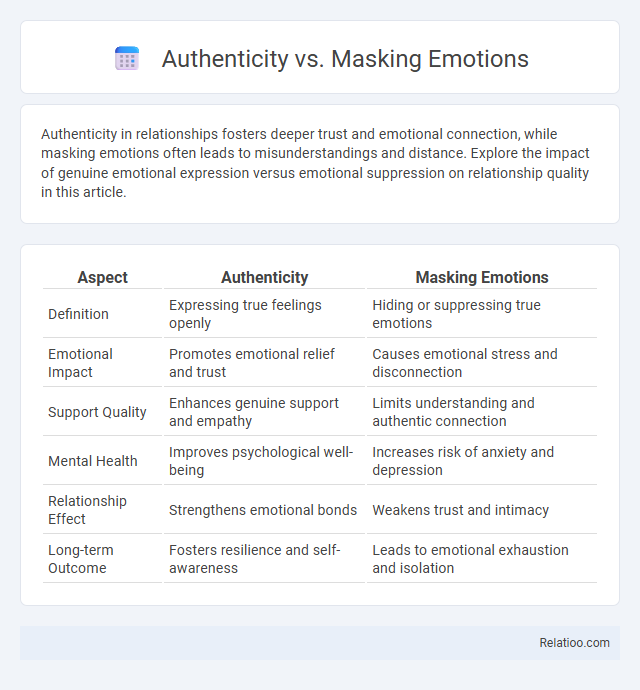Authenticity in relationships fosters deeper trust and emotional connection, while masking emotions often leads to misunderstandings and distance. Explore the impact of genuine emotional expression versus emotional suppression on relationship quality in this article.
Table of Comparison
| Aspect | Authenticity | Masking Emotions |
|---|---|---|
| Definition | Expressing true feelings openly | Hiding or suppressing true emotions |
| Emotional Impact | Promotes emotional relief and trust | Causes emotional stress and disconnection |
| Support Quality | Enhances genuine support and empathy | Limits understanding and authentic connection |
| Mental Health | Improves psychological well-being | Increases risk of anxiety and depression |
| Relationship Effect | Strengthens emotional bonds | Weakens trust and intimacy |
| Long-term Outcome | Fosters resilience and self-awareness | Leads to emotional exhaustion and isolation |
Understanding Authenticity: What Does It Mean?
Understanding authenticity involves recognizing and expressing one's true emotions without hiding behind social masks or artificial personas. Authenticity fosters shared vulnerability, encouraging genuine connections where individuals feel safe to be imperfect and open. Embracing authenticity requires self-awareness and the courage to reveal emotions honestly, which strengthens relationships and promotes emotional well-being.
The Psychology Behind Masking Emotions
Masking emotions involves concealing true feelings to conform to social expectations or avoid negative consequences, often leading to increased psychological stress and diminished emotional well-being. Research in psychological studies shows that persistent emotional masking can impair authentic communication and hinder the development of deep interpersonal connections. Embracing shared vulnerability promotes psychological resilience and emotional intimacy by encouraging honesty and genuine expression over guardedness.
Authentic Expression: Benefits for Mental Health
Authentic expression fosters mental well-being by reducing psychological stress and enhancing emotional resilience. Embracing genuine emotions cultivates trust and deepens social connections, which are crucial for emotional support and overall mental health. Masking emotions often leads to increased anxiety and depression, whereas shared vulnerability promotes understanding and healing through open communication.
Why Do We Mask Our True Feelings?
People mask their true feelings to protect themselves from judgment, rejection, or emotional harm in social and professional environments. Masking emotions often serves as a defense mechanism to maintain control, avoid conflict, or conform to societal expectations. Embracing shared vulnerability fosters genuine connections by encouraging authenticity and reducing the fear associated with revealing one's true emotional state.
Social Expectations and Emotional Masking
Social expectations often pressure individuals to mask emotions, leading to inauthentic interactions that prioritize conformity over genuine expression. Emotional masking serves as a defense mechanism to navigate societal norms but can hinder true connection and shared vulnerability. Embracing authenticity challenges these norms, fostering deeper relationships through honest emotional exchange and reducing psychological stress associated with emotional repression.
The Impact of Masking Emotions on Relationships
Masking emotions creates barriers that hinder genuine connection and trust in relationships, leading to misunderstandings and emotional distance. When individuals conceal their true feelings, it prevents shared vulnerability, which is essential for deep emotional intimacy and mutual support. Over time, this emotional suppression can increase stress and reduce relationship satisfaction, weakening the bond between partners or friends.
Authenticity in the Workplace: Challenges and Rewards
Authenticity in the workplace fosters trust, promotes open communication, and enhances team cohesion by encouraging employees to express their true selves without fear of judgment. Challenges include navigating organizational cultures that may implicitly or explicitly reward masking emotions, leading to emotional labor and decreased job satisfaction. Embracing authenticity yields rewards such as increased engagement, improved mental health, and stronger interpersonal connections that drive productivity and innovation.
Strategies for Cultivating Emotional Authenticity
Cultivating emotional authenticity involves embracing vulnerability by openly sharing your true feelings while recognizing the impact of masking emotions on mental well-being. Strategies include practicing mindful self-awareness, fostering safe environments for honest communication, and developing emotional literacy to accurately identify and express emotions. Prioritizing these approaches helps you build deeper connections and promotes genuine interpersonal relationships.
Recognizing the Signs of Emotional Masking
Emotional masking often presents as forced smiles, inconsistent body language, or vague responses to personal questions, signaling a disconnect between true feelings and outward expressions. Recognizing these signs helps you foster genuine connections by encouraging transparency and shared vulnerability. Awareness of emotional masking enhances empathy and supports healthier, more authentic relationships.
Moving Toward a More Authentic Life
Embracing authenticity involves recognizing and expressing genuine emotions rather than masking feelings to conform to external expectations. Shared vulnerability fosters deeper connections by allowing individuals to reveal their true selves without fear of judgment. Moving toward a more authentic life requires cultivating self-awareness, practicing emotional honesty, and building relationships grounded in trust and empathy.

Infographic: Authenticity vs Masking Emotions
 relatioo.com
relatioo.com